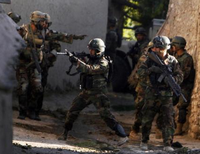As details of the successful raid against Osama bin Laden's Abbotabad compound come to light, it is becoming clear that the assault was the most important, and probably the most successful, operation in the history of U.S. special operations forces. Instead of Air Force bombs or Navy missiles, President Barack Obama opted for the special skills and capabilities of a Navy SEAL team to eliminate the al-Qaida leader. The reason is simple: A bomb or missile might have more easily killed bin Laden, but only special forces could confirm his death, recover his body and capture a trove of materials associated with the terrorist group.
The high-profile success of this operation may reawaken a debate about the role that special operations forces (SOF) play in the U.S. military and in American strategic thought. Although the lot of special operators has improved substantially since the 1980s, and especially over the past decade, SOF still occupy a curious position among the traditional military services. While SOF act in many ways independently of their parent services, and have congressionally protected resource streams, they still depend on the traditional services for recruitment, training and other functions. As recognized in the 1980s, however, SOF often have more in common with each other in terms of culture and strategic approach than with their home services. Accordingly, it might be time to reconsider a proposal from the 1980s to give special forces their own independent military service.
Special forces have long had difficulty finding their rightful place in the American military. During the Cold War, differences between the organizational culture of the SOF and that of the Marine Corps and the Army made for an uncomfortable fit. The traditional services were committed to a vision of war that involved large-scale conventional combat against the Soviet Union in Western Europe. To the extent that the capabilities of SOF had value, it was in support of these conventional operations. Rather than take advantage of conceivably transformational SOF capabilities, or conceive of alternative missions that SOF might do quite well, the traditional services shoehorned SOF into the conventional battle plan. SOF were also given responsibility for missions that the conventional military branches were uninterested in undertaking. This included the early stages of counterinsurgency in Vietnam, but also a variety of counterterrorist operations.

